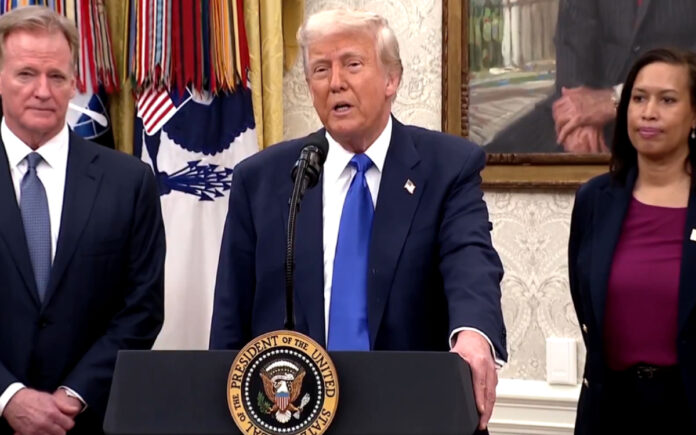Washington: President Donald Trump brushed off criticism on Monday over an AI-generated image depicting him as the pope—an image shared on the White House’s official social media channels—as nothing more than a lighthearted joke. However, communication and political media experts argue the implications are far from amusing.
The AI-generated images, posted over the weekend, featured Trump in white papal robes in one photo and holding a red “Star Wars” lightsaber commonly associated with the franchise’s antagonists in another. To many, they resembled Trump’s characteristic use of provocative visual content—tools he’s long wielded to captivate supporters and antagonize opponents.
Since returning to office on January 20, Trump has once again dominated media attention. In an otherwise uneventful news cycle, the viral AI images ensured his presence remained firmly at the center of public discourse.
Throughout his political journey, Trump has used striking and often theatrical visuals—from riding in a garbage truck to standing with a Bible outside a church during police brutality protests. Yet, experts told Reuters that unlike those real-world scenes, AI-generated images cross a dangerous line by merging fantasy with politics in a way that may confuse, mislead, or polarize the public.
“I think we are seeing a new phenomenon – the merging of social media and AI power, organized for political power and narrative dominance,” said John Wihbey, director of the AI-Media Strategies Lab at Northeastern University in Boston.
“He’s exploiting this uncharted territory,” Wihbey added. “I suspect politicians around the world will begin to use generative AI and social together in newfound ways.”
Trump, when asked about the controversial pope image, downplayed its significance. “I had nothing to do with it,” he said. “It was just, somebody did it in fun. It’s fine. Have to have a little fun don’t you?” The image first appeared on Trump’s Truth Social account before being amplified across the White House’s official platforms.
The White House did not respond to questions about who manages Trump’s Truth Social content or who originally created the AI-generated images.
However, for many Catholics across the U.S., Italy, and other regions, the image of Trump dressed as the pope struck a deeply offensive chord. Critics accused the administration of disrespecting religious institutions and using sacred symbols for political theatrics.
“This is an image that offends believers, insults institutions and shows that the leader of the global right enjoys being a clown,” wrote former Italian Prime Minister Matteo Renzi on X (formerly Twitter).
Democratic strategist Michael Ceraso interpreted the incident as a calculated stunt. “He’s the first influencer president,” Ceraso said, encouraging fellow Democrats not to be distracted by Trump’s constant stream of online provocations.
Also Read | Barbie-Maker Mattel to Raise Prices as Trade War Escalates Costs
According to Ceraso, Trump takes inspiration from the world of professional wrestling: “You can be the bad guy or the good guy as long as you are getting crowd reaction.”
Since reclaiming the presidency, Trump has shared several AI-generated visuals, including a beachfront luxury resort in Gaza, as well as images of himself reimagined as a king and as a gangster akin to Al Capone.
Experts Warn of a More Sinister Turn
Jennifer Mercieca, a scholar of presidential rhetoric at Texas A&M University, warned that the use of AI imagery is more than showmanship—it’s a strategic move to shape public perception in times of waning support.
“Trump’s policies are unpopular, and his presidency is unpopular,” Mercieca explained. “Within this context, Trump has created a visual fantasy of himself as a hero, attempting to persuade the nation (and the world) that he is, in fact, a hero.”
Also Read | Google Launches New Film and TV Production Arm ‘100 Zeros’ in Bid to Expand Media Footprint
Recent polling by Reuters/Ipsos supports that view. Trump’s approval rating currently stands at 42%, with 53% of Americans disapproving of his leadership. That’s a decline from the 47% he enjoyed in the early days of his return.
Wihbey also cautioned that the real test will come if Trump or other politicians begin inserting themselves into highly realistic, historically fabricated AI images. “The danger grows exponentially,” he noted, “if AI is used to forge moments that never happened, but appear authentic.”



